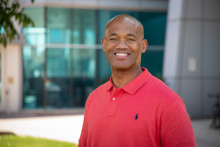Phi Delta Kappan and National Institute for Staff and Organizational Development (NISOD)
 MESA, Arizona – April 19, 2022 – To educate and encourage others, Professor Andrea Brownlee, an Education Studies faculty member at Mesa Community College, shares his experience as a young student who was not encouraged to work in STEM or become an educator. Brownlee’s article, Schooling and the power of perception, appears in the national education journal Phi Delta Kappan. The National Institute for Staff and Organizational Development published Brownlee’s abstract Viewing BIPOC Students as S.T.E.A.M. Professionals.
MESA, Arizona – April 19, 2022 – To educate and encourage others, Professor Andrea Brownlee, an Education Studies faculty member at Mesa Community College, shares his experience as a young student who was not encouraged to work in STEM or become an educator. Brownlee’s article, Schooling and the power of perception, appears in the national education journal Phi Delta Kappan. The National Institute for Staff and Organizational Development published Brownlee’s abstract Viewing BIPOC Students as S.T.E.A.M. Professionals.
Brownlee speaks on the subject of racism, classism and color blindness referencing his background as a non-traditional student who enjoyed learning, but struggled in school to make the connections between an ideal curriculum and real life application. Professor Brownlee had to learn to navigate the drug epidemic that engulfed his community in the late 1980s, making him hyper-visible to the judicial system and the police because of his age, race and class; while simultaneously trying to avoid the school-to-prison pipeline in high school.
In the article, Brownlee delves deeply into the effects of racism, class and classism on the education system from the perspective of both student and teacher. Using studies, statistics and poignant tales of personal experience to make his point, he explains how low expectations can lead to low student performance, how youth can process and learn from their trauma, and the damage that the exceedingly white middle-class mindset of the education system does to students. The teachers' low expectations were rooted in the overlap of racism, classism and the non-traditional family structure. The article ends with a plea for educators and activists to have high expectations of their students, children and employees to lift them up so they may achieve greater feats.
Brownlee begins Viewing BIPOC Students as S.T.E.A.M. Professionals by using his own experiences to share how Black, Indigenous, People of Color and impoverished students may struggle with the culture created by schools, illustrating the lack of diversity among teachers and explaining the negative impact that it has on students.
“Instructor demographics in the United States should reflect student demographics, but they do not,” Brownlee says. “White people make up about 60 percent of the U.S. population, but represent 79 percent of all teachers, meaning they are overrepresented in the teaching profession by almost 20 percentage points.”
Brownlee notes the disparity extends into a lack of BIPOC and women in S.T.E.A.M. fields. He also shares the challenges faced by BIPOC and women entering S.T.E.A.M. The abstract closes with a description of a program started at MCC to address this disparity called Full STEAM Ahead.
Learn more about the education studies offered at MCC and the classes taught by Brownlee at mesacc.edu/departments/education-studies.
# # #
Media contact: Dawn Zimmer, 480-461-7892, dawn.zimmer@mesacc.edu
Mesa Community College is nationally recognized for university transfer, career and technical programs, civic engagement, service-learning and innovative approaches to education. On average MCC students provide 23,000 hours of community service annually. For more than 50 years, the college has served as a resource for education, workforce development and lifelong learning. Host to more than 25,400 students annually, MCC offers degree and certificate programs at its two campuses and additional locations through a combination of modalities. MCC is transforming how it champions student success through Guided Pathways with Integrated Support Services and a commitment to diversity, equity and inclusion. MCC is a Hispanic Serving Institution with nearly 50% of its students being the first in their families to attend college. MCC has the largest indigenous student population of all the Maricopa Community Colleges; its American Indian Institute serves students from the 22 federally recognized Arizona tribes as well as out-of-state tribes. The diverse student body includes hundreds of international students from around the world. Award-winning faculty are dedicated to student success, providing the education and training that empowers MCC students to attain their goals. Located in the East Valley of Phoenix, Arizona, on the traditional territories of the O'odham, Piipaash and Yavapai Peoples, MCC is one of 10 colleges in the Maricopa County Community College District. Visit mesacc.edu to learn more.
Mesa Community College is accredited by the Higher Learning Commission (HLC) -- hlcommission.org.
The Maricopa County Community College District (MCCCD) is an EEO/AA institution and an equal opportunity employer of protected veterans and individuals with disabilities. All qualified applicants will receive consideration for employment without regard to race, color, religion, sex, sexual orientation, gender identity, age, or national origin. A lack of English language skills will not be a barrier to admission and participation in the career and technical education programs of the District. MCCCD does not discriminate on the basis of race, color, national origin, sex, disability or age in its programs or activities. For Title IX/504 concerns, call the following number to reach the appointed coordinator: (480) 731-8499. For additional information, as well as a listing of all coordinators within the Maricopa College system, visit maricopa.edu/non-discrimination.

